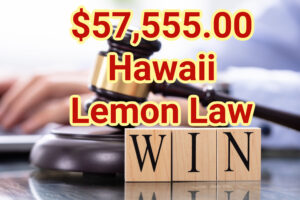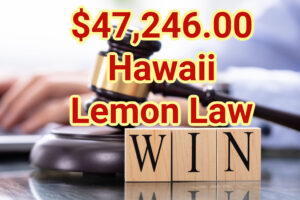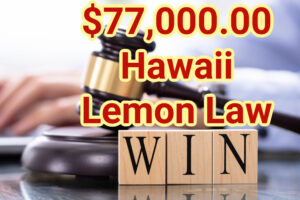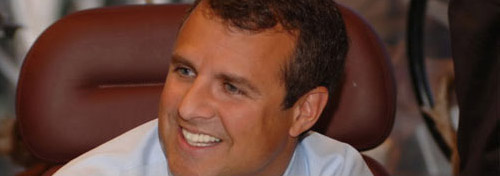Lemon Law Hawaii Introduction
Driving a Lemon Car in Hawaii? You have legal rights under the Hawaii Lemon Law which may permit you to obtain one of the following: a new car, a full refund, or a partial refund for your defective car at no cost to you.
The Hawaii lemon law is a generic term for laws that protect consumers from defective vehicles. In the state of Hawaii, the Automobile Lemon Law applies to any new vehicle that is purchased or leased, and/or first registered, in the state of Hawaii.
The Hawaii Lemon Law Attorneys
The Hawaii Lemon Law firm of David J. Gorberg & Associates has represented clients throughout Hawaii, including Oahu, Maui, Kauai, Big Island and Lanai.
With offices located at 1050 Queen Street in Honolulu, Five Star Google Reviews, numerous HI Lemon Law Settlements and member of the Hawaii Trial Lawyers Association, we are the lawyers to turn to for the Hawaii Lemon Law.
Lemon Law HI Information
Click Title To Jump To Section
What to do if I have a Lemon
- Ideally, your automobile dealer should work with you to resolve the problem. It is in their best interest to take care of the problem to increase the likelihood of future car sales.
- In the event you can’t resolve the problem with the dealer, you can contact a Hawaii Lemon Law Lawyer.
Let The Hawaii Lemon Law Attorney, David J. Gorberg & Associates, Help You

- Tell Us About Your Lemon
Fill out our form or call us at 1-800-MY-LEMON - We Evaluate Your Case at NO Cost
We contact the Manufacturer and negotiate settlement - Compensation For Your Automobile
You receive compensation and the manufacturer pays our fees
Begin Here or Call 1-800-MY-LEMON
Hawaii Lemon Law Guide
The Hawaii lemon law covers any consumer who buys, or leases, a new motor vehicle in the state.
Hawaii’s lemon law establishes a “Lemon Law Rights Period.” That period is defined as the term of the manufacturer’s express warranty, two years after the vehicle’s delivery to the consumer, or the first 24,000 miles of operation; whichever is sooner.
Under the Hawaii Lemon Law your car may be declared a lemon if it meets all the following conditions:
- It has a nonconformity (a defect, or condition) which is covered by the manufacturer’s express warranty
- The nonconformity SUBSTANTIALLY impairs the use, market value, or safety of the car
- The nonconformity is not the result of an accident, abuse, neglect, or alteration of the car by persons other than the manufacturer or its authorized dealer
- The vehicle was subject to 3 or more repairs within the Lemon Law rights period, or
- The vehicle was subject to 1 repair for a condition that could cause a serious bodily injury within the lemon law rights period, or
- The vehicle remains inoperable or out of service for 30 days or more during the lemon law rights period
- You sent written notification (Hawaii Lemon Law Letter) to the manufacturer (not the dealer) of the nonconformity during the Lemon Law Rights Period.
See our most recent Hawaii lemon law settlements
2022 Hyundai Santa Cruz – Hawaii Lemon Law Buy Back
Transmission defects – Full refund of purchase price, and all attorney fees settlement within 60 days of calling our firm.
Ewa Beach, Oahu
2023 Chevy Tahoe – Hawaii Lemon Law Buy Back
Airbag light defect and safety restraint system warning – Case filed in the Hawaii State Certified Lemon Law Arbitration Program (SCAP) and verdict for full refund and attorney fees.
Wailuku, Maui
2022 Honda Pilot – Hawaii Lemon Law Buy Back
Engine Defects – Case filed in the Hawaii State Certified Lemon Law Arbitration Program (SCAP) and verdict for full refund and attorney fees.
Koloa, Kauai
2021 Chevy Blazer – Hawaii Lemon Law Buy Back
Stalling defect and Fuel Pump Defect – Case filed in the Hawaii State Certified Lemon Law Arbitration Program (SCAP) and verdict for full refund and attorney fees.
Keaau, Hawaii – Big Island
2022 Toyota 4 Runner – Hawaii Lemon Law Back
Steering and Alignment Defects – Case filed in the Hawaii State Certified Lemon Law Arbitration Program (SCAP) and verdict for full refund and attorney fees.
Ewa Beach, Oahu
2019 Chevy Silverado – Hawaii Lemon Law Cash Settlement
Engine problems – Client received a substantial cash settlement, including all attorney fees within 60 days of calling our firm.
Honolulu, Oahu
2021 Chevrolet Tahoe – Hawaii Lemon Law Buy Back
Forward Collision Problems – Full refund of purchase price, and all attorney fees settlement within 60 days of calling our firm.
Waipahu, Oahu
2022 Ford Explorer – Hawaii Lemon Law Buy Back
Engine problems – Full refund of purchase price, and all attorney fees settlement within 30 days of calling our firm.
Kaneohe, Oahu
2019 Nissan Frontier – Hawaii Lemon Law Cash Settlement
Suspension Problems – Client received a substantial cash settlement, including all attorney fees within 60 days of calling our firm.
Lihue, Kauai
Hawaii Lemon Law FAQ
The Hawaii Lemon Law was enacted for the express purpose of protecting consumers from buying or leasing new, but faulty, motor vehicles. The law seeks to make sure that the manufacturer of the vehicle fixes any problems or defects that were originally covered under the manufacturer’s warranty and were subject to repair at least 3 times for problems during the first 24,000 miles or subject to repair 1 time for a problem that can cause a bodily injury.
Potential Outcomes for You Through Hawaii Lemon Law
Refund For Your Lemon Vehicle
In the case of a vehicle refund, the refund is calculated by taking the full purchase price of the vehicle, and then subtracting a “reasonable allowance for vehicle use.”
In addition, the refund can include the money you spent for:
- Sales tax, license and registration fees, finance charges, and any additional costs such as these
- Options or modifications added by the manufacturer or its authorized dealer within 30 days after delivery date
- Trade-in value
- Attorney fees
- Expert witnesses
- The filing fee for the lemon law
By “reasonable allowance for vehicle use,” this means the number of miles up to the date of the third repair attempt or the date of the first repair attempt for a serious safety defect, or the date of the 30th cumulative business day when the car is out of service by reason of repair, whichever occurs first. The reasonable offset for use is one percent of the purchase price for every thousand miles of use
Replacement For Your Lemon Vehicle
The manufacturer can offer to replace the vehicle, although you do not have to accept their offer (opting instead for a refund). However, if the manufacturer refuses to refund your money, you can take them to court. If you do accept a replacement vehicle, and the original vehicle was financed, the manufacturer must make sure the financing is transferred from the original vehicle to the replacement vehicle. It is your responsibility to have the title and registration transferred to your new vehicle.
Cash Settlement And You Keep Car
Hawaii Lemon Law Statute
(HRS 481I – 1 to HRS 481I-4)
Here is a copy of the Hawaii Lemon Law.
Our Lemon Law Work Speaks For Itself
Five Star Reviews on Google for Honolulu and Hawaii






Talk to an experienced Hawaii Lemon Law Lawyer and Get a Free Case Evaluation
To learn more about the Hawaii Lemon Law, call our Hawaii Lemon Law office at 1-800-MY-LEMON (1-800-695-3666) or email the Lemon Law Attorney.
David J. Gorberg & Associates – The Hawaii Lemon Law Attorneys
1050 Queen Street, Suite 100, Honolulu, HI 96814








